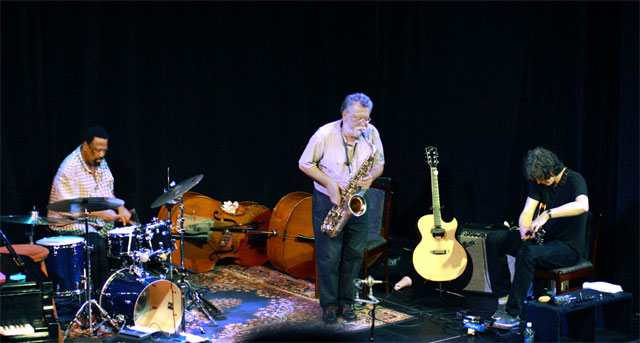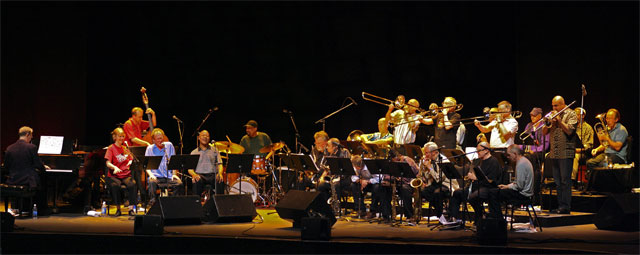|
An intriguing aspect of The Dedication Orchestra’s performance at the VECC was that the house had sold out almost exclusively on word of mouth and publicity. Subsequently, their first set was an introduction that could win over that 90% of the house, or not. Granted, there are a few items in their repertoire that, given the point-blank range afforded by the intimate venue, could have sent some folks scrambling to the exits, and fast. In this regard, beginning the set with Dudu Pukwana’s “Hug Pine” made perfect sense. Django Bates’ arrangement begins with just enough of a flourish to give fair warning of the mass of sound the DO can produce (as well as serving up a sweet dollop of Harry Beckett’s flugelhorn); he lets the singers (Maggie Nichols, Phil Minton and David Sarame on this occasion) caress the languid melody; and, he notches up the energy in the middle of the piece, providing a fine platform for tenor saxophonist Julian Arguelles to solo persuasively.
Bringing the set to an early simmer with Pukwana’s “Mra” was another smart tactical decision. Sean Bergin’s chart takes a tight weave of lines, and rotates them through the horn sections as the piece progresses. All the while, the pulse was intensified by Moholo-Moholo, John Edwards and Steve Beresford (who, due to the absence of Keith Tippett, played piano and conducted, daunting double duty that he performed admirably). Bergin’s best decision, however, was to be brief, and not let the piece be diluted by long-winded solos; it was therefore an effective jolt. The balm-like Pukwana’s “B My Dear” followed. This is a melody that, once in your head, may not leave for days. Kenny Wheeler’s arrangement was true to the romantic essence of the ballad, though he slipped in some of his trademark melancholy during the concluding ensemble. It is also a great vehicle for alto saxophonist Ray Warleigh, whose lyrical sweep was punctuated by lines that cut through the chord changes like a hot knife through butter.
“Manje,” Chris McGregor’s heartily chugging blues, and Harry Miller’s painfully beautiful “Lost Opportunities” continued the set’s push and pull between celebration and lament (the latter featured poignant interplay between trumpeter Jim Dvorak and both Sarame and Nichols), a dynamic culminating in the last two pieces before intermission. Miller’s “Dancing Damon” has both ebullience and edge, established through the tension between the jabbing parts for trombones and Dave Powell’s tuba and the brighter lines for trumpets and saxophones (Keith Tippett arranged both Miller pieces; both revealed his keen interpretative insight). The slot for unaccompanied trombone was allotted to Alan Tomlinson, one of the less jazz-oriented players in the band; and he set a decidedly non-idiomatic tone for a provocative trombone quartet with Paul Rutherford, Dave Amis and Fayyaz Virji. Mongesi Feza’s “You Don’t Know Me ‘Cause You Think You Know Me” is one of, if not the most uplifting compositions of the South African exiles’ canon, and Eddie Parker’s arrangement makes one want to stand as if hearing one’s national anthem. Marc Charig soared on an ordinarily earthbound instrument, the throaty tenor horn. The finale begged the question: How do they top that?
The answer came immediately upon the start of the second set: Chris McGregor’s “Andromeda,” which brilliantly melds kwela jubilation and unhinged swing. The thread of Brotherhood of Breath-era McGregor was continued with “Travelling Somewhere.” Beresford’s arrangement starts out in left field: a short fanfare built upon gruff low brass and disinterested trumpets gives way to soprano saxophonist Lol Coxhill, whose cadenza encapsulated his idiosyncrasy. However, Beresford quickly gets to the funky essence of the tune and emphasizes McGregor’s debt to Ellington, particularly in his comping. At the last minute, Beresford veers off the highway for a short bumpy ride, highlighted by Rutherford’s chortles, and then brings it home.
Two more Pukwana tunes kept the pace up. A tribute to the sixth Blue Note, tenor saxophonist Nick Moyake, “Blues For Nick” is a straight-up mid-tempo blues. There are initial glints of Oliver Nelson in Dave Powell’s arrangement, and some pre-Rahsaan Roland Kirk in Neil Metcalfe’s solo (the flutist was much more satisfyingly present in the mix here than on disc). With baritone saxophonist Chris Biscoe’s heated solo, shades of the controlled chaos pioneered by Mingus emerged, ending the piece more intensely than it began. “Angel-Nomali” has a gentle sway and a graceful melody sprinkled with piquant phrases. Wheeler’s arrangement had its complexities, but they did not mitigate the flow of the material or the fire of alto saxophonist Jason Yarde and trumpeter Claude Deppa.
There does not seem to be a consensus among some of Moholo-Moholo’s colleagues on how the word “Woza” translates exactly into English: generally, it is a special exclamatory salutation. The DO began to wrap up the evening with “Woza,” the collective blow that backdrops Moholo-Moholo’s shout-outs to his fallen comrades and those on the bandstand who, by all rights, should have been close to dropping. With Deppa sitting in on drums, Moholo-Moholo came down in front of the band, and summoned the spirits, one thought, for the last time. With a mighty crescendo, The Dedication Orchestra came to what would have been a logical stopping-point. Yet, with the cheering crowd still on its feet, the orchestra launched into “Union Special,” McGregor’s madcap anthem that amalgamates Western movie theme and martial music. There is something inscrutable about the piece – it is not simply zany or a cartoon-hammer-over-the-head obvious parody – but it does make one feel like the good guys won, for once.
The orchestra opened for Ladysmith Black Mambazo the next evening at The Centre, a Garth Drabinsky-built monstrosity that is much more fitting for Andrew Lloyd Weber musicals than jazz. Instead of the largely acoustic sound they had at the VECC, the DO was heavily reinforced, and sounded like an audiophile CD instead of a live orchestra as a result. For the most part, their one set drew upon the previous evening’s set list, beginning with “Mra,” “B My Dear,” “Manje,” and “Angel-Nomali.” Tucked into the middle of the set was Feza’s “Sondela,” a brightly hued melody well tailored for Nichols, Minton and Sarame’s soulful delivery. “Dancing Damon,” “You Don’t Know Me …,” “Woza,” and “Union Special” closed the set. About 50 people in the orchestra section gave the band a standing ovation, but many of the better dressed people headed up the aisles, more intent on avoiding long waits at the lobby bars and wash rooms.
|
|



